Features Used to Classify Animals
By the end of this section, you will be able to:
- Explain the differences in animal body plans that support basic animal classification
- Compare and contrast the embryonic development of protostomes and deuterostomes
Scientists have developed a classification scheme that categorizes all members of the animal kingdom, although there are exceptions to most “rules” governing animal classification ([link]). Animals are primarily classified according to morphological and developmental characteristics, such as a body plan. One of the most prominent features of the body plan of true animals is that they are morphologically symmetrical. This means that their distribution of body parts is balanced along an axis. Additional characteristics include the number of tissue layers formed during development, the presence or absence of an internal body cavity, and other features of embryological development, such as the origin of the mouth and anus.
Art Connection
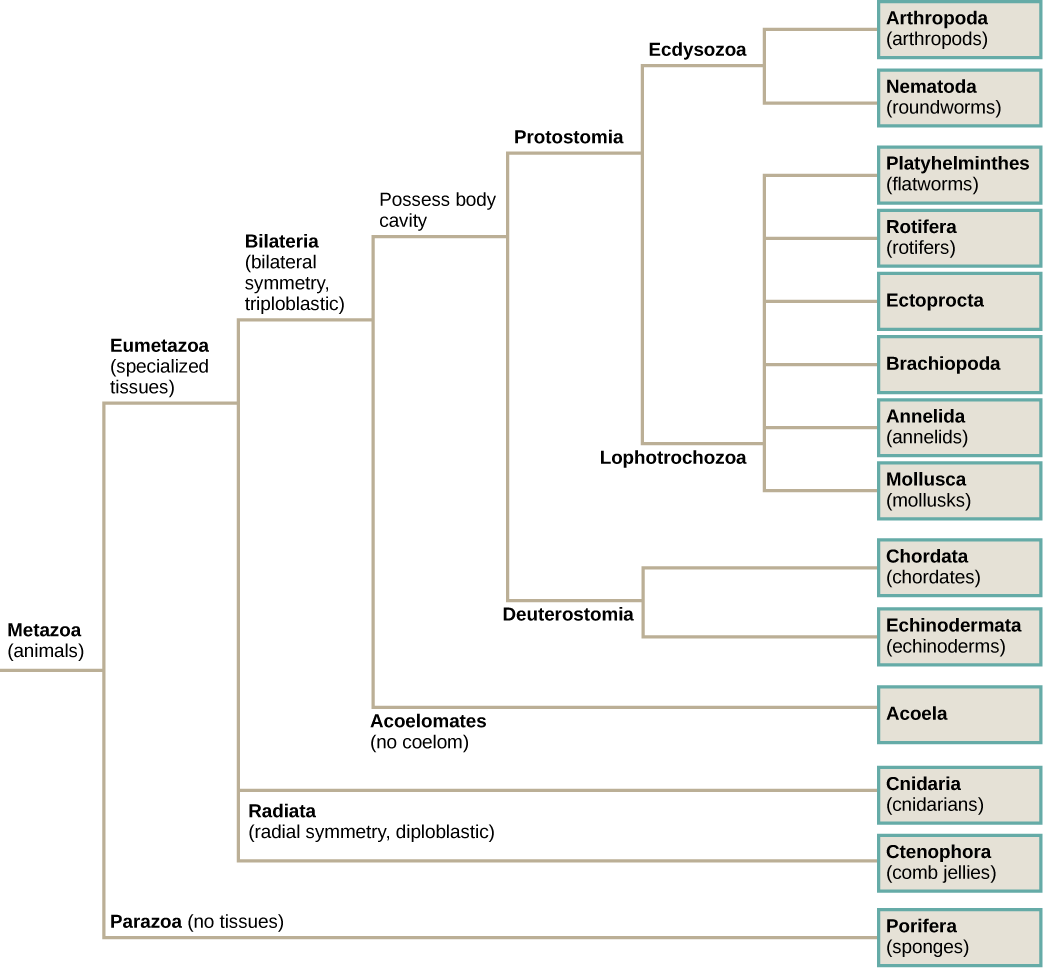
Which of the following statements is false?
- Eumetazoans have specialized tissues and parazoans don’t.
- Lophotrochozoa and Ecdysozoa are both Bilataria.
- Acoela and Cnidaria both possess radial symmetry.
- Arthropods are more closely related to nematodes than they are to annelids.
Animal Characterization Based on Body Symmetry
At a very basic level of classification, true animals can be largely divided into three groups based on the type of symmetry of their body plan: radially symmetrical, bilaterally symmetrical, and asymmetrical. Asymmetry is a unique feature of Parazoa ([link]a). Only a few animal groups display radial symmetry. All types of symmetry are well suited to meet the unique demands of a particular animal’s lifestyle.
Radial symmetry is the arrangement of body parts around a central axis, as is seen in a drinking glass or pie. It results in animals having top and bottom surfaces but no left and right sides, or front or back. The two halves of a radially symmetrical animal may be described as the side with a mouth or “oral side,” and the side without a mouth (the “aboral side”). This form of symmetry marks the body plans of animals in the phyla Ctenophora and Cnidaria, including jellyfish and adult sea anemones ([link]bc). Radial symmetry equips these sea creatures (which may be sedentary or only capable of slow movement or floating) to experience the environment equally from all directions.
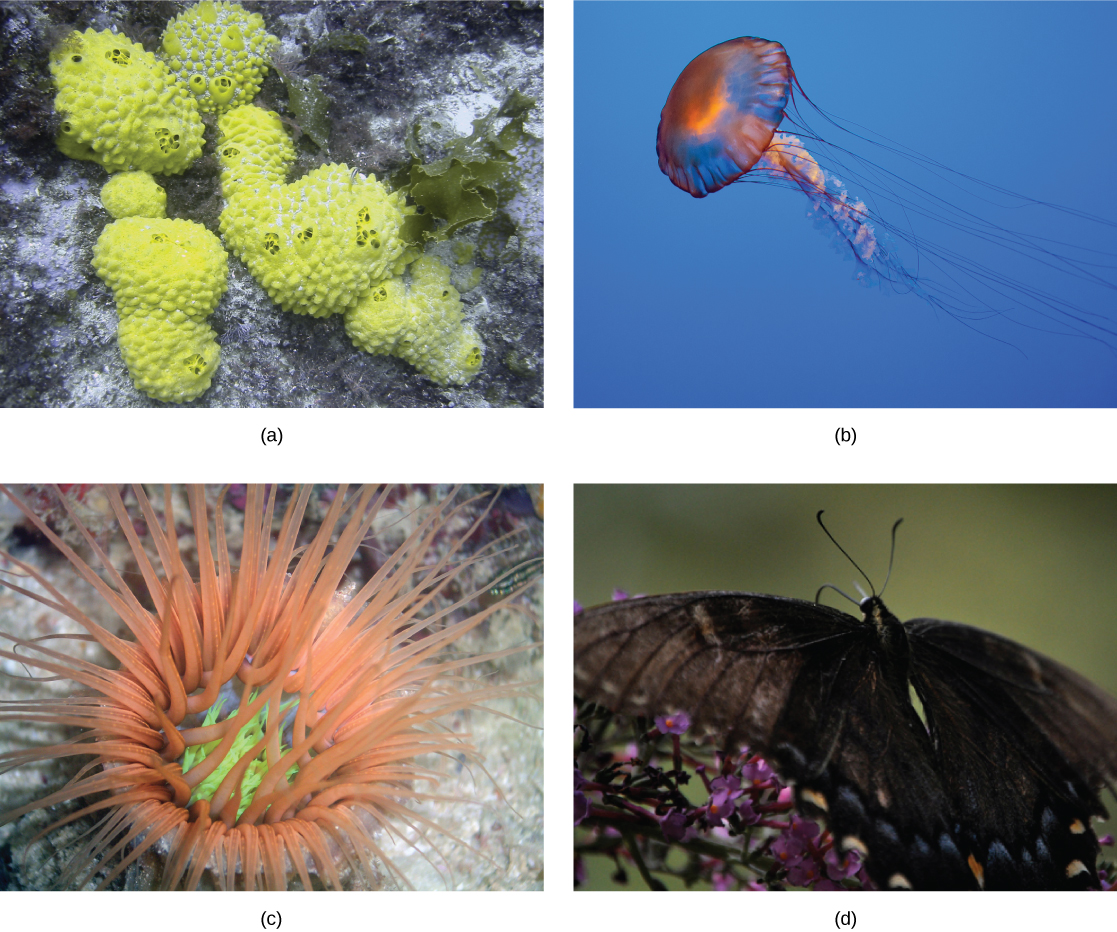
Bilateral symmetry involves the division of the animal through a sagittal plane, resulting in two mirror image, right and left halves, such as those of a butterfly ([link]d), crab, or human body. Animals with bilateral symmetry have a “head” and “tail” (anterior vs. posterior), front and back (dorsal vs. ventral), and right and left sides ([link]). All true animals except those with radial symmetry are bilaterally symmetrical. The evolution of bilateral symmetry that allowed for the formation of anterior and posterior (head and tail) ends promoted a phenomenon called cephalization, which refers to the collection of an organized nervous system at the animal’s anterior end. In contrast to radial symmetry, which is best suited for stationary or limited-motion lifestyles, bilateral symmetry allows for streamlined and directional motion. In evolutionary terms, this simple form of symmetry promoted active mobility and increased sophistication of resource-seeking and predator-prey relationships.
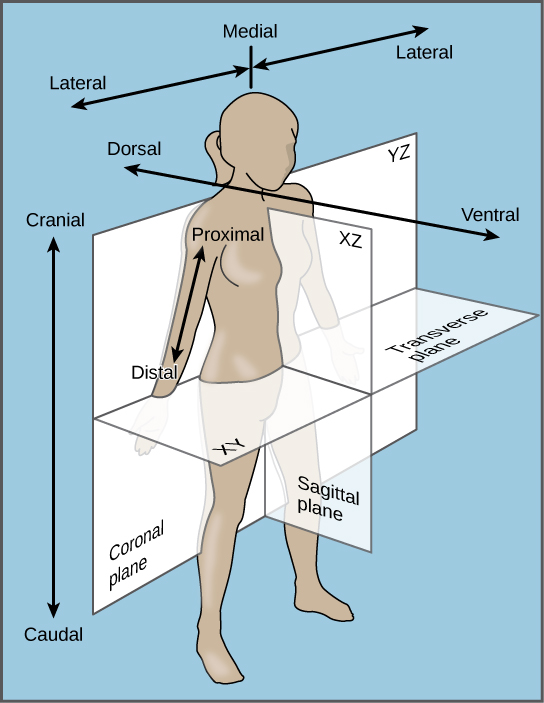
Animals in the phylum Echinodermata (such as sea stars, sand dollars, and sea urchins) display radial symmetry as adults, but their larval stages exhibit bilateral symmetry. This is termed secondary radial symmetry. They are believed to have evolved from bilaterally symmetrical animals; thus, they are classified as bilaterally symmetrical.
Link to Learning
 Watch this video to see a quick sketch of the different types of body symmetry.
Watch this video to see a quick sketch of the different types of body symmetry.
Animal Characterization Based on Features of Embryological Development
Most animal species undergo a separation of tissues into germ layers during embryonic development. Recall that these germ layers are formed during gastrulation, and that they are predetermined to develop into the animal’s specialized tissues and organs. Animals develop either two or three embryonic germs layers ([link]). The animals that display radial symmetry develop two germ layers, an inner layer (endoderm) and an outer layer (ectoderm). These animals are called diploblasts. Diploblasts have a non-living layer between the endoderm and ectoderm. More complex animals (those with bilateral symmetry) develop three tissue layers: an inner layer (endoderm), an outer layer (ectoderm), and a middle layer (mesoderm). Animals with three tissue layers are called triploblasts.
Art Connection
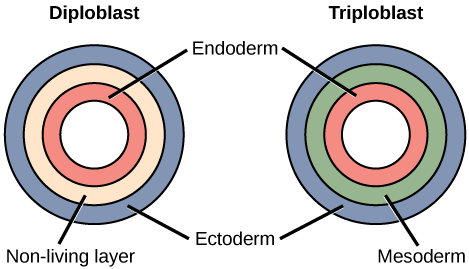
Which of the following statements about diploblasts and triploblasts is false?
- Animals that display radial symmetry are diploblasts.
- Animals that display bilateral symmetry are triploblasts.
- The endoderm gives rise to the lining of the digestive tract and the respiratory tract.
- The mesoderm gives rise to the central nervous system.
Each of the three germ layers is programmed to give rise to particular body tissues and organs. The endoderm gives rise to the lining of the digestive tract (including the stomach, intestines, liver, and pancreas), as well as to the lining of the trachea, bronchi, and lungs of the respiratory tract, along with a few other structures. The ectoderm develops into the outer epithelial covering of the body surface, the central nervous system, and a few other structures. The mesoderm is the third germ layer; it forms between the endoderm and ectoderm in triploblasts. This germ layer gives rise to all muscle tissues (including the cardiac tissues and muscles of the intestines), connective tissues such as the skeleton and blood cells, and most other visceral organs such as the kidneys and the spleen.
Presence or Absence of a Coelom
Further subdivision of animals with three germ layers (triploblasts) results in the separation of animals that may develop an internal body cavity derived from mesoderm, called a coelom, and those that do not. This epithelial cell-lined coelomic cavity represents a space, usually filled with fluid, which lies between the visceral organs and the body wall. It houses many organs such as the digestive system, kidneys, reproductive organs, and heart, and contains the circulatory system. In some animals, such as mammals, the part of the coelom called the pleural cavity provides space for the lungs to expand during breathing. The evolution of the coelom is associated with many functional advantages. Primarily, the coelom provides cushioning and shock absorption for the major organ systems. Organs housed within the coelom can grow and move freely, which promotes optimal organ development and placement. The coelom also provides space for the diffusion of gases and nutrients, as well as body flexibility, promoting improved animal motility.
Triploblasts that do not develop a coelom are called acoelomates, and their mesoderm region is completely filled with tissue, although they do still have a gut cavity. Examples of acoelomates include animals in the phylum Platyhelminthes, also known as flatworms. Animals with a true coelom are called eucoelomates (or coelomates) ([link]). A true coelom arises entirely within the mesoderm germ layer and is lined by an epithelial membrane. This membrane also lines the organs within the coelom, connecting and holding them in position while allowing them some free motion. Annelids, mollusks, arthropods, echinoderms, and chordates are all eucoelomates. A third group of triploblasts has a slightly different coelom derived partly from mesoderm and partly from endoderm, which is found between the two layers. Although still functional, these are considered false coeloms, and those animals are called pseudocoelomates. The phylum Nematoda (roundworms) is an example of a pseudocoelomate. True coelomates can be further characterized based on certain features of their early embryological development.
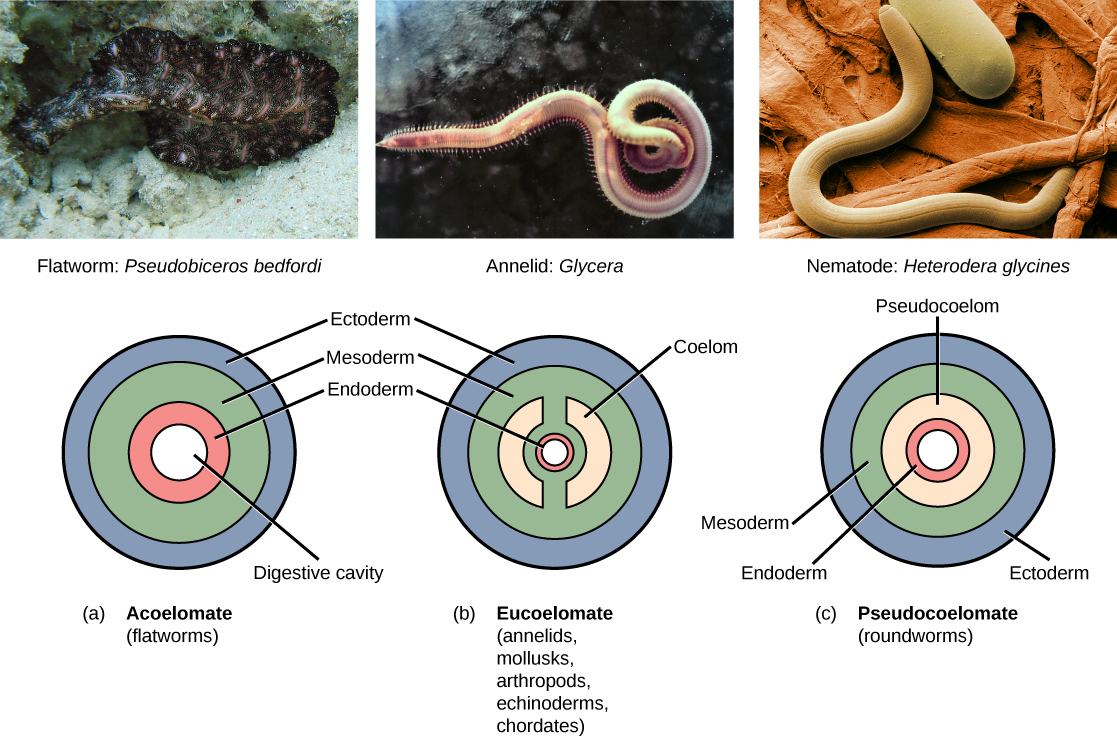
Embryonic Development of the Mouth
Bilaterally symmetrical, triploblastic eucoelomates can be further divided into two groups based on differences in their early embryonic development. Protostomes include arthropods, mollusks, and annelids. Deuterostomes include more complex animals such as chordates but also some simple animals such as echinoderms. These two groups are separated based on which opening of the digestive cavity develops first: mouth or anus. The word protostome comes from the Greek word meaning “mouth first,” and deuterostome originates from the word meaning “mouth second” (in this case, the anus develops first). The mouth or anus develops from a structure called the blastopore ([link]). The blastopore is the indentation formed during the initial stages of gastrulation. In later stages, a second opening forms, and these two openings will eventually give rise to the mouth and anus ([link]). It has long been believed that the blastopore develops into the mouth of protostomes, with the second opening developing into the anus; the opposite is true for deuterostomes. Recent evidence has challenged this view of the development of the blastopore of protostomes, however, and the theory remains under debate.
Another distinction between protostomes and deuterostomes is the method of coelom formation, beginning from the gastrula stage. The coelom of most protostomes is formed through a process called schizocoely, meaning that during development, a solid mass of the mesoderm splits apart and forms the hollow opening of the coelom. Deuterostomes differ in that their coelom forms through a process called enterocoely. Here, the mesoderm develops as pouches that are pinched off from the endoderm tissue. These pouches eventually fuse to form the mesoderm, which then gives rise to the coelom.
The earliest distinction between protostomes and deuterostomes is the type of cleavage undergone by the zygote. Protostomes undergo spiral cleavage, meaning that the cells of one pole of the embryo are rotated, and thus misaligned, with respect to the cells of the opposite pole. This is due to the oblique angle of the cleavage. Deuterostomes undergo radial cleavage, where the cleavage axes are either parallel or perpendicular to the polar axis, resulting in the alignment of the cells between the two poles.
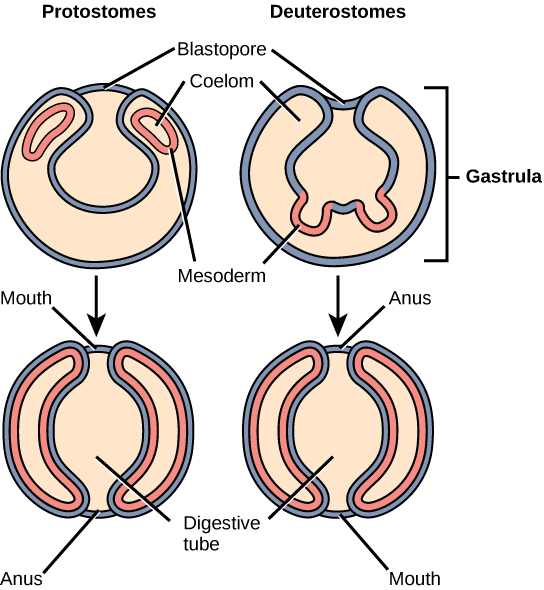
There is a second distinction between the types of cleavage in protostomes and deuterostomes. In addition to spiral cleavage, protostomes also undergo determinate cleavage. This means that even at this early stage, the developmental fate of each embryonic cell is already determined. A cell does not have the ability to develop into any cell type. In contrast, deuterostomes undergo indeterminate cleavage, in which cells are not yet pre-determined at this early stage to develop into specific cell types. These cells are referred to as undifferentiated cells. This characteristic of deuterostomes is reflected in the existence of familiar embryonic stem cells, which have the ability to develop into any cell type until their fate is programmed at a later developmental stage.
Evolution Connection
The Evolution of the CoelomOne of the first steps in the classification of animals is to examine the animal’s body. Studying the body parts tells us not only the roles of the organs in question but also how the species may have evolved. One such structure that is used in classification of animals is the coelom. A coelom is a body cavity that forms during early embryonic development. The coelom allows for compartmentalization of the body parts, so that different organ systems can evolve and nutrient transport is possible. Additionally, because the coelom is a fluid-filled cavity, it protects the organs from shock and compression. Simple animals, such as worms and jellyfish, do not have a coelom. All vertebrates have a coelom that helped them evolve complex organ systems.
Animals that do not have a coelom are called acoelomates. Flatworms and tapeworms are examples of acoelomates. They rely on passive diffusion for nutrient transport across their body. Additionally, the internal organs of acoelomates are not protected from crushing.
Animals that have a true coelom are called eucoelomates; all vertebrates are eucoelomates. The coelom evolves from the mesoderm during embryogenesis. The abdominal cavity contains the stomach, liver, gall bladder, and other digestive organs. Another category of invertebrates animals based on body cavity is pseudocoelomates. These animals have a pseudo-cavity that is not completely lined by mesoderm. Examples include nematode parasites and small worms. These animals are thought to have evolved from coelomates and may have lost their ability to form a coelom through genetic mutations. Thus, this step in early embryogenesis—the formation of the coelom—has had a large evolutionary impact on the various species of the animal kingdom.
Section Summary
Organisms in the animal kingdom are classified based on their body morphology and development. True animals are divided into those with radial versus bilateral symmetry. Generally, the simpler and often non-motile animals display radial symmetry. Animals with radial symmetry are also generally characterized by the development of two embryological germ layers, the endoderm and ectoderm, whereas animals with bilateral symmetry are generally characterized by the development of a third embryological germ layer, the mesoderm. Animals with three germ layers, called triploblasts, are further characterized by the presence or absence of an internal body cavity called a coelom. The presence of a coelom affords many advantages, and animals with a coelom may be termed true coelomates or pseudocoelomates, depending on which tissue gives rise to the coelom. Coelomates are further divided into one of two groups called protostomes and deuterostomes, based on a number of developmental characteristics, including differences in zygote cleavage and method of coelom formation.
Art Connections
[link] Which of the following statements is false?
- Eumetazoans have specialized tissues and parazoans don’t.
- Lophotrochozoa and Ecdysozoa are both Bilataria.
- Acoela and Cnidaria both possess radial symmetry.
- Arthropods are more closely related to nematodes than they are to annelids.
[link] Which of the following statements about diploblasts and triploblasts is false?
- Animals that display radial symmetry are diploblasts.
- Animals that display bilateral symmetry are triploblasts.
- The endoderm gives rise to the lining of the digestive tract and the respiratory tract.
- The mesoderm gives rise to the central nervous system.
Review Questions
Which of the following organism is most likely to be a diploblast?
- sea star
- shrimp
- jellyfish
- insect
Which of the following is not possible?
- radially symmetrical diploblast
- diploblastic eucoelomate
- protostomic coelomate
- bilaterally symmetrical deuterostome
An animal whose development is marked by radial cleavage and enterocoely is ________.
- a deuterostome
- an annelid or mollusk
- either an acoelomate or eucoelomate
- none of the above
Free Response
Using the following terms, explain what classifications and groups humans fall into, from the most general to the most specific: symmetry, germ layers, coelom, cleavage, embryological development.
Humans have body plans that are bilaterally symmetrical and are characterized by the development of three germ layers, making them triploblasts. Humans have true coeloms and are thus eucoelomates. As deuterostomes, humans are characterized by radial and indeterminate cleavage.
Explain some of the advantages brought about through the evolution of bilateral symmetry and coelom formation.
The evolution of bilateral symmetry led to designated head and tail body regions, and promoted more efficient mobility for animals. This improved mobility allowed for more skillful seeking of resources and prey escaping from predators. The appearance of the coelom in coelomates provides many internal organs with shock absorption, making them less prone to physical damage from bodily assault. A coelom also gives the body greater flexibility, which promotes more efficient movement. The relatively loose placement of organs within the coelom allows them to develop and grow with some spatial freedom, which promoted the evolution of optimal organ arrangement. The coelom also provides space for a circulatory system, which is an advantageous way to distribute body fluids and gases.
Glossary
- acoelomate
- animal without a body cavity
- bilateral symmetry
- type of symmetry in which there is only one plane of symmetry, so the left and right halves of an animal are mirror images
- blastopore
- indentation formed during gastrulation, evident in the gastrula stage
- coelom
- lined body cavity
- determinate cleavage
- developmental tissue fate of each embryonic cell is already determined
- deuterostome
- blastopore develops into the anus, with the second opening developing into the mouth
- diploblast
- animal that develops from two germ layers
- enterocoely
- mesoderm of deuterostomes develops as pouches that are pinched off from endodermal tissue, cavity contained within the pouches becomes coelom
- eucoelomate
- animal with a body cavity completely lined with mesodermal tissue
- indeterminate cleavage
- early stage of development when germ cells or “stem cells” are not yet pre-determined to develop into specific cell types
- protostome
- blastopore develops into the mouth of protostomes, with the second opening developing into the anus
- pseudocoelomate
- animal with a body cavity located between the mesoderm and endoderm
- radial cleavage
- cleavage axes are parallel or perpendicular to the polar axis, resulting in the alignment of cells between the two poles
- radial symmetry
- type of symmetry with multiple planes of symmetry, with body parts (rays) arranged around a central disk
- schizocoely
- during development of protostomes, a solid mass of mesoderm splits apart and forms the hollow opening of the coelom
- spiral cleavage
- cells of one pole of the embryo are rotated or misaligned with respect to the cells of the opposite pole
- triploblast
- animal that develops from three germ layers

This work is licensed under a Creative Commons Attribution 4.0 International License.
You can also download for free at http://cnx.org/contents/185cbf87-c72e-48f5-b51e-f14f21b5eabd@11.2
Attribution:







